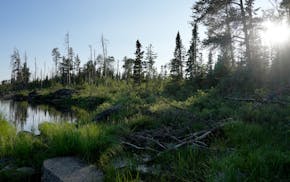Opinion editor's note: Strib Voices publishes a mix of commentary online and in print each day. To contribute, click here.
•••
When our family bought a 96-year-old farmstead in southeast Minnesota, I knew from many conversations over the years with conservationist Jeff Broberg that my ongoing responsibilities would include regularly testing our well water.
A geologist by training and a passionate trout fisherman, Broberg was one of the state's most influential clean water advocates. He co-founded the Minnesota Well Owners Organization (MNWOO), volunteered with countless conservation organizations, wrote commentaries for the Minnesota Star Tribune and passionately shared the knowledge gleaned from his own farm near Whitewater State Park to help the public understand water quality threats, particularly from agricultural practices.
Because of what I learned from Jeff about the fragile geology of this region, we treat our water and monitor it monthly for nitrates and other contaminants. I wish I'd been able to thank him properly before he passed April 12 from pancreatic cancer. Sadly, I had to relay my gratitude when I spoke to his wife, Erica, for this column.
I suspect many other Minnesotans take proactive well-management steps, too, thanks to this gifted environmental educator and his lifetime of work. That's quite a legacy. As his MNWOO co-founder Paul Wotzka told me, Broberg leaves behind some "big muddy boots to fill."
Broberg, 71, was a rare combination of stellar scientist, outstanding communicator and fierce but friendly combatant in the public arena. He fielded many phone calls from journalists and other Minnesotans, breaking down complex issues in a way that nonscientists could understand. He also told hard truths that could put him at odds with powerful interests, such as agricultural lobbies, state agencies and Minnesota's outdoor sports organizations.
In one memorable 2010 commentary for the Star Tribune, Broberg took hunters and anglers to task in a tense dispute over how to use dollars generated by the state's Legacy Amendment sales tax, passed in 2008. Broberg argued, correctly in my view, that the mission went beyond buying land or easements.
"I question the tunnel vision of those who insist that Legacy Amendment funds should support only game and fish," Broberg wrote. Instead, the Legacy Amendment should focus on the "full range" of what it means to protect the physical and biological world.
"Natural resource management incorporates clean water, healthy soil, vibrant microorganisms and a diversity of plants and animals ... Ecosystem health is for the benefit of life, not just for the benefit of fish and wildlife."
One the most memorable times my path crossed Broberg's was in late 2011, when I was researching an editorial on a dubious move by Republican legislators to oust the director of the Legislative-Citizen Commission on Minnesota Resources (LCCMR). The LCCMR manages the state lottery-funded Environment and Natural Resources Trust Fund.
Broberg, who served as an LCCMR citizen appointee, wasn't afraid to speak out on the record against this when I called. He didn't stop there, phoning an influential Republican state senator from the Rochester area, bluntly telling the legislator that GOP House members were leaving a "political mess" on the upper chamber's doorstep.
In 2016, Broberg took aim in another commentary at the Minnesota Departments of Agriculture and Natural Resources, along with the state Pollution Control Agency, accusing the agencies of pulling their punches on the cause of a massive fish kill in the south branch of the Whitewater River.
"The agencies have run away from the obvious conclusion — that modern farm chemicals currently authorized for crop protection can kill fish and pollute our water even when chemicals are applied at recommended and currently legal rates," Broberg wrote. "Our agencies have totally failed to communicate the possible health and environmental impacts and seem intent on ignoring the interests and values of Minnesotans."
Despite his sharp elbows, Broberg continued to be respected at the State Capitol on both sides of the aisle. Former Republican House Speaker Steve Sviggum appointed him to the LCCMR. Former DFL House speaker Margaret Anderson Kelliher reappointed him.
"His knowledge superseded partisanship over a 20-year period," said state Rep. Rick Hansen, DFL-South St. Paul, who co-chairs the Minnesota House Agriculture Finance and Policy Committee.
Broberg's outgoing personality and passion for fishing and the outdoors kept lines of communication open with those who held differing views. When he spoke, it was clear that his motivation came from deeply held principles and decades of experience, Hansen said. His hopeful vision for a better Minnesota also kept doors open for him at the Capitol.
"He was just persistently optimistic, that facts would win out, that reason would win out, that there was an opportunity to make a difference," Hansen said.
Erica Broberg said her husband's deep love of trout fishing came from time spent as a child with his Wisconsin grandmother, who employed intriguing techniques to always catch enough fish for dinner. He grew up in Minneapolis and met Erica at the University of Minnesota.
Their 48-year marriage took them to Texas and then back to Minnesota and to an area that Broberg had long loved: the so-called "Driftless Region," a part of southeast Minnesota and southwest Wisconsin notable for its unglaciated topography. Broberg worked as an environmental consultant. The couple bought a farm near St. Charles, Minn., and lived there for decades.
Erica Broberg said farm ownership played a key role in her husband's environmental advocacy. She said a horse health emergency in the late 1980s particularly impacted him. The veterinarian told the couple that nitrates in the water may have contributed to the mare losing twin foals. "I don't think we really understood the effects of farming on the environment when we moved here," she said.
Jeff Broberg's environmental advocacy continued until hours before his passing. The day before he died, he participated in a virtual meeting about monitoring pesticides in private wells.
Wotzka, who is MNWOO's president, said that the organization will continue its important work "full bore" despite a heartbreaking loss. An upcoming initiative will focus on private wells in south-central Minnesota and includes a collaboration with a medical researcher.
"We'll be going forward on that grant," Wotzka said. "That's what he would have wanted."
For information on MNWOO or to make a memorial donation, go to mnwoo.org.
Burcum: 'Big Beautiful Bill' takes hatchet to health care
Burcum: 'Why would we make it harder to get help' for addiction?
!["Republicans want to overturn this newfound eligibility [for undocumented immigrants to enroll in MinnesotaCare], which was passed by DFL majorities i](https://arc.stimg.co/startribunemedia/XZLGO62KH5G6DHR55ER5IECZAY.jpg?h=91&w=145&fit=crop&bg=999&crop=faces)
Burcum: Don't rush the decision on undocumented immigrant health coverage

